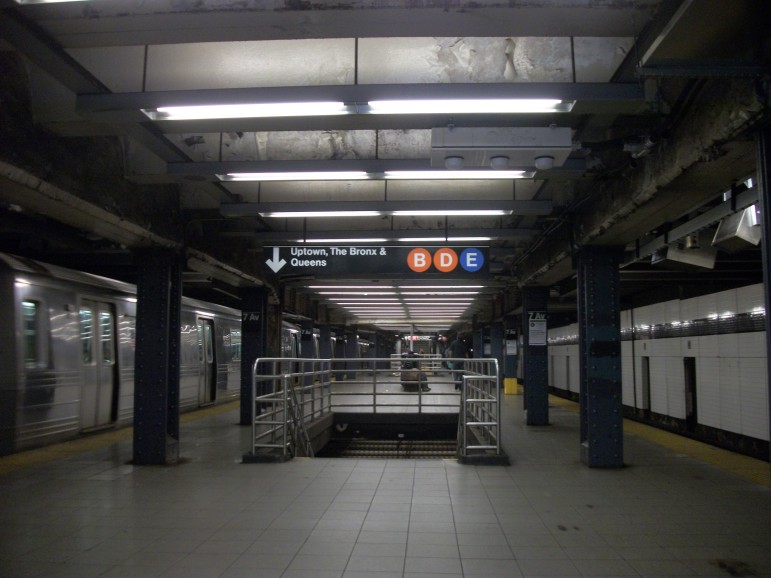
Dan TD
The subway platform where Brian Watkins family was killed in 1990. A bid by Johnny Hincapie to overturn his conviction for a role in the attack hinges on whether witnesses saw him somewhere other than this platform at the time of the assault.
A Manhattan judge on Thursday ruled that a freelance City Limits reporter was protected under the state’s media shield law from a subpoena, but said some of the evidence sought by prosecutors fell outside the law’s scope and ordered it handed over.
The ruling came as the judge, Eduardo Padro, began hearing evidence in a bid by Johnny Hincapie to overturn his conviction for a role in the 1990 murder of Utah tourist Brian Watkins in a Manhattan subway station. The first witness was a man jailed for 18 months on suspicion of a part in the slaying, who alleged NYPD detectives beat him in a precinct locker room to try to coerce a confession.
Hincapie, now 42, was one of seven men convicted in the attack on September 2, 1990 in the 53rd Street/7th Avenue subway station on the Watkins family, who were in town for the U.S. Open, by a pack of teenagers looking for money to pay the cover charge to see a DJ perform at the Roseland Ballroom. Watkins was stabbed while trying to protect his mother. The crime came near the height of the city’s crime wave and captured wide public attention.
City Limits in 2010 published a lengthy investigation of the crime and Hincapie’s assertions of innocence. Eighteen at the time of the killing, Hincapie claims his confession was coerced and that exculpatory evidence—including witnesses who placed him away from the crime scene at the time of the attack—was ignored. The City Limits report attracted the attention of famed defense lawyer Ron Kuby, whose firm now represents Hincapie’s attempt to overturn his 1991 conviction.
The author of that story, Bill Hughes, who provided an affidavit about his work for use by the defense team, received a subpoena late last year from the Manhattan District Attorney’s office demanding notes, diary entries, recordings, emails and more pertaining to Hughes’ interactions with nine people, including Hincapie, two of Hincapie’s former lawyers and six men connected to the 1990 incident. It threatened Hughes with possible prosecution for contempt of court, imprisonment for up to a year and a $1,000 fine if he refuses to comply.
With television cameras rolling, Padro ruled Thursday that “as a paid freelancer who was doing essentially annual articles that were in-depth and investigative,” Hughes was protected by the state’s shield law, which affords unique protection to reporters because of their fact-finding duties. Padro also ruled that the subpoena was “overbroad.”
But while asserting that “the law is crystal clear: Confidential materials should not be turned over,” Padro ruled that “non-confidential” material might be subject to subpoena because of their singular import to the prosecution’s case. Prosecutors have argued that Hincapie’s earlier statements admitting to the crime undermine his later professions of innocence, and they have questioned the motives and credibility of the supporting witnesses he has called.
Padro set some elements of the subpoena aside altogether, but ordered that Hughes turn over some of the notes requested by the prosecutors for inspection by him to determine what prosecutors need to see.
In a brief conference with the judge and lawyers for Hincapie and the Manhattan DA, Hughes said he’d seek the advice of counsel before deciding whether to comply with the order.
Later, when the evidentiary hearing got underway, the court heard from Luis Montero, a Queens man who on the night of the crime traveled with Hincapie and a large group of teenagers to see the DJ. Montero claimed he saw Hincapie on the upper level of the subway station while the killing was occurring below. Detained and brought to a precinct, Montero said detectives took him into an empty locker room. “Every time I said something they didn’t like, they’d hit me,” he claimed. Eventually, he said, “I told them, ‘F—k you, I ain’t gonna tell you nothing.” He was brought to Rikers Island and held for 18 months until being released without charge.
Asked why he waited two decades to tell anyone what he knew about a teenage acquaintance who may have been wrongfully imprisoned on a 25-years=to-life stint, Montero said he was advised by his lawyer, “‘This is about you. You’ve got to take care of yourself.'” He also claims his family received threats signed by the KKK while he was in prison, making him afraid of stirring up any trouble. “It was part of my life that I needed to keep closed,” he said.
Prosecutors questioned Montero’s credibility, suggesting that he’d been influenced by an investigator for Hincapie, according to the New York Times.








